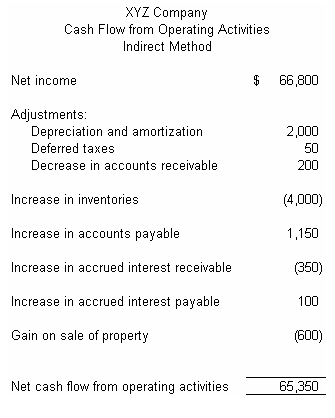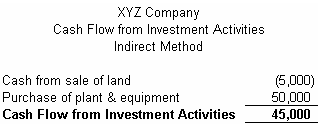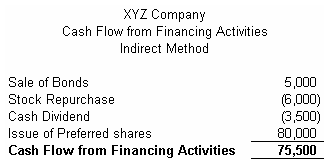Published On:Thursday, 29 December 2011
Posted by Muhammad Atif Saeed
Cash Flow Computations - Indirect Method
Under U.S. and ISA GAAP, the statement of cash flow can be presented by means of two ways:
The Indirect MethodThe indirect method is preferred by most firms because is shows a reconciliation from reported net income to cash provided by operations.
Calculating Cash flow from OperationsHere are the steps for calculating the cash flow from operations using the indirect method:
In general, candidates should utilize the following rules:
The following example illustrates a typical net cash flow from operating activities:
Cash Flow from Investment ActivitiesCash Flow from investing activities includes purchasing and selling long-term assets and marketable securities (other than cash equivalents), as well as making and collecting on loans.
Here's the calculation of the cash flows from investing using the indirect method:
Cash Flow from Financing ActivitiesCash Flow from financing activities includes issuing and buying back capital stock, as well as borrowing and repaying loans on a short- or long-term basis (issuing bonds and notes). Dividends paid are also included in this category, but the repayment of accounts payable or accrued liabilities is not.
Here's the calculation of the cash flows from financing using the indirect method:
- The indirect method
- The direct method
The Indirect MethodThe indirect method is preferred by most firms because is shows a reconciliation from reported net income to cash provided by operations.
Calculating Cash flow from OperationsHere are the steps for calculating the cash flow from operations using the indirect method:
- Start with net income.
- Add back non-cash expenses.
- (Such as depreciation and amortization)
- Adjust for gains and losses on sales on assets.
- Add back losses
- Subtract out gains
- Account for changes in all non-cash current assets.
- Account for changes in all current assets and liabilities except notes payable and dividends payable.
In general, candidates should utilize the following rules:
- Increase in assets = use of cash (-)
- Decrease in assets = source of cash (+)
- Increase in liability or capital = source of cash (+)
- Decrease in liability or capital = use of cash (-)
The following example illustrates a typical net cash flow from operating activities:
 |
Cash Flow from Investment ActivitiesCash Flow from investing activities includes purchasing and selling long-term assets and marketable securities (other than cash equivalents), as well as making and collecting on loans.
Here's the calculation of the cash flows from investing using the indirect method:
 |
Cash Flow from Financing ActivitiesCash Flow from financing activities includes issuing and buying back capital stock, as well as borrowing and repaying loans on a short- or long-term basis (issuing bonds and notes). Dividends paid are also included in this category, but the repayment of accounts payable or accrued liabilities is not.
Here's the calculation of the cash flows from financing using the indirect method:
 |









